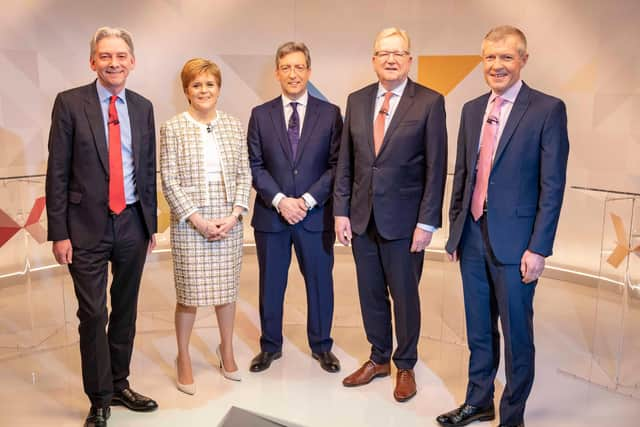Analysis: What to expect from the Holyrood election's first TV debate
On Tuesday night, the leaders of Scotland’s five biggest political parties – not including Alex Salmond, as far as we know – will lock horns over Scotland’s biggest issues on BBC One from 7:50pm.
TV debates are rarely about discussing issues with any real depth. Instead they are an exercise in expectation management for new leaders and in endless repetition of key messaging.
Advertisement
Hide AdAdvertisement
Hide AdThe BBC debate is the first opportunity for the parties to set out their stall directly to voters, which for some party leaders is more critical than for others.


For Nicola Sturgeon the end goal is uncomplicated.
She will have to set out why it is right for a country where only a quarter of people believe independence is one of Scotland’s top three priorities to push for a second referendum on the constitution.
Her challenge will be to present this as a critical aspect of Scotland’s Covid-19 recovery plan and deflect attacks from unionist parties that this is either a distraction or the wrong priority.
Success will come if, despite the inevitable points of weakness on care home deaths and the Salmond scandal, the First Minister can tap into the perceived strengths of her handling of Covid-19 and critically convince viewers she is the one to trust with the recovery.
Douglas Ross will likely do everything he possibly can to keep the focus on indyref2, despite claims from the Scottish Conservatives that it is the last thing anyone wants to talk about.
His party’s strategy is simple and clear – hoover up as many unionist votes as possible and the belief is by reminding voters of the SNP’s singular mindset they will pick up those for whom the constitution is king.
Expect Mr Ross to continually bring back Ms Sturgeon’s points on Covid recovery to the potential for a ‘divisive’ second independence referendum while focusing on the SNP's domestic failures, all while not mentioning Boris Johnson.
It is also Mr Ross’s first real test as Scottish Tory leader in front of the cameras and his first chance to make a positive impact on voters and improve his poor approval ratings.
Advertisement
Hide AdAdvertisement
Hide AdAnas Sarwar meanwhile will focus solely on domestic issues such as health, education and jobs. He will attempt to appear as the pragmatic option and a ‘proper’ opposition, while Mr Ross and Ms Sturgeon shout about the constitution.
Expect to hear a lot of Scottish Labour’s election mantra of ‘Scotland deserves better’ and attempts to clearly establish themselves as the strongest party on domestic issues.
The Liberal Democrats and the Scottish Greens will be doing anything they can to seem relevant.
Constituencies are where Willie Rennie’s party is strongest, so it will be a balancing act between shoring up their classic vote while providing a third, credible option in terms of recovery and pro-unionist sentiment.
That niche is small and it is likely the Liberal Democrats may struggle to make inroads into the main thrust of the debate.
The Scottish Greens will attempt to speak to younger, more progressive left-wing voters, highlighting climate credentials. Expect mentions of the eviction ban, of wins on public sector pay and on the exams fiasco, alongside calls for stronger environment action.
A message from the Editor:
Thank you for reading this article. We're more reliant on your support than ever as the shift in consumer habits brought about by coronavirus impacts our advertisers.
If you haven't already, please consider supporting our trusted, fact-checked journalism by taking out a digital subscription.
Comments
Want to join the conversation? Please or to comment on this article.